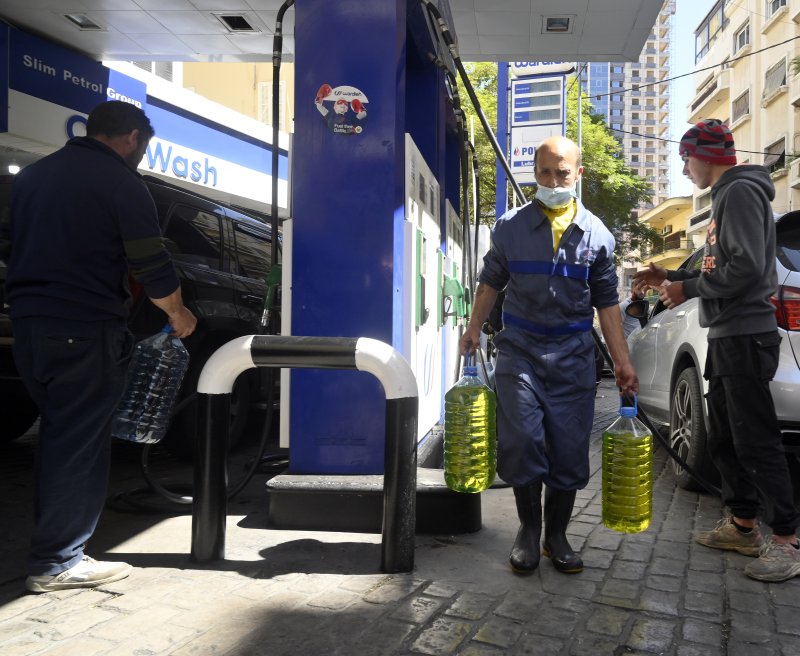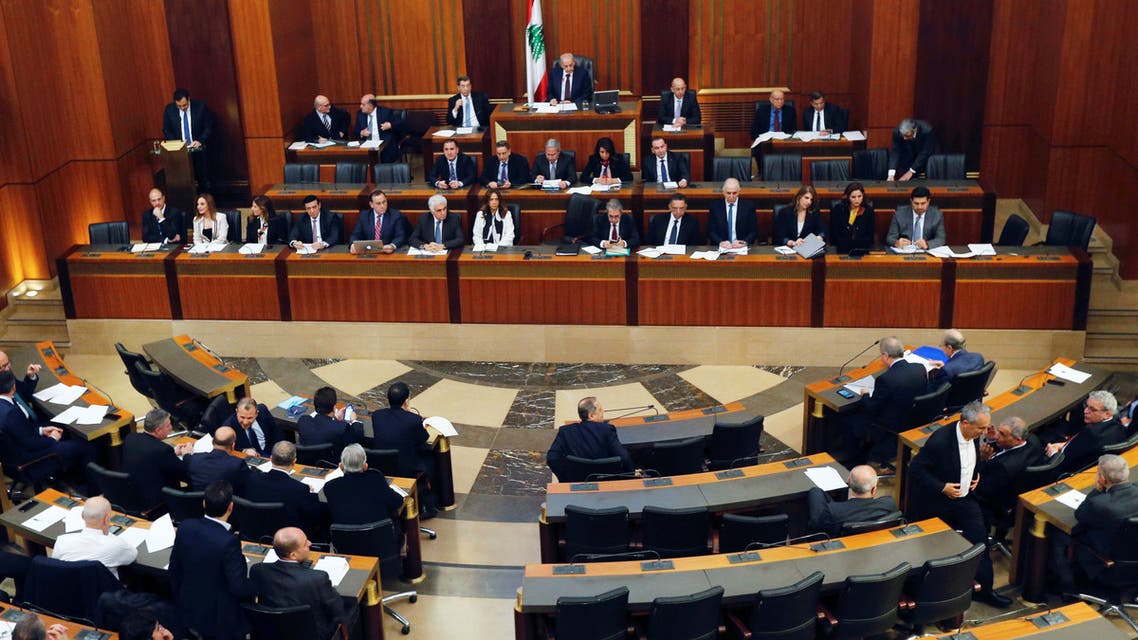By Hanin Ghaddar -- english.alarabiya.net -- Put simply, Lebanon is an Iranian colony. As protest slogans indicate, the Lebanese people are finally aware of this reality. The presence and ineffective statements of the former pro-West March 14 political parties means the international community needs clarity about who really controls the country. Only then can policy be drawn accordingly. For the latest headlines, follow our Google News channel online or via the app. The March 14 leaders always justify their inactions by using the fear factor – that if they resign, Hezbollah will take over the state institutions, and they want to make sure they can protect what small margin of independence they have left in Lebanon. Another argument is that they want to prevent the chaos that will happen if state institutions fall completely.
This logic is outdated. Chaos has arrived, and the state – as in the decision of war, government formation, or economy – is in the hands of the Iranian regime and its proxy. The Beirut Port blast and the assassination of Lokman Slim are two examples of how inadequate the state institutions’ roles have become. Without clarity, the international community will continue to try to find an economic solution, to handle Lebanon as a humanitarian crisis. This is dangerous because it hides the real problem, which is political, not financial. If former March 14 leaders get their parliamentary blocs and ministers to resign, the political core of the crisis will be exposed. This could lead to a new and more urgent policy for Lebanon – one that addresses Iran’s hegemony and how to counter it, instead of focusing on humanitarian assistance. A meeting between Lebanese President Michel Aoun and PM-designate Saad Hariri last week ended poorly. Failing to reach a much anticipated breakthrough for the formation of a government the theatrical exchange of accusations was a clear indicator that any new government in Lebanon is some way off.

by arabnews.com -- LONDON: A popular Lebanese TV show has come under fire for another incident of offensive behavior. “Indian, I’m not sure — but British-Indian…” the latest guest on the consistently criticized MTV Lebanon show “3a Gheir Kawkab” (On Another Planet) explained, before shaking her head — mocking the traditional Indian nod — and in a stereotypical Indian accent, said: “Madame you’re very beautiful.” The show’s presenter — Pierre Rabbat — and other hosts broke into laughter as the paid crowd roared in applause. By contrast, social media exploded with anger at the blatant racist mockery the variety show was presenting. “The group from ‘3a Gheir Kawkab’ have made the program out of this planet to utter all kinds of pettiness, absurdity, humiliation, disgust, and whatever you want,” said Twitter user Leila Ghotaimi.
Brigitte K. Mountain tweeted: “Morons! And such a grotesque disconnect from what’s happening in the country.” This is now the state of Lebanese television — once a media pioneer of the region that attracted talent from all over — but now a symbol of the country’s dwindling standards. Lebanon has been facing multiple crises since the start of last year. It has endured national demonstrations protesting flagrant corruption and collapsing standards of living, alongside a political standstill that sees its politicians bickering among one another while the Lebanese pound continues to freefall.

By CALINE MALEK -- arabnews.com -- DUBAI: One Lebanese man has worked day and night since the devastating Beirut blast of Aug. 4 last year to ensure his lifetime’s work is salvaged from the rubble. In less than six months, Robert Paoli became the first trader to reopen a warehouse in the Port of Beirut Logistic Free Zone following the disaster. “I’ve worked in the freight-forwarding business all my life,” the 57-year-old told Arab News. “I always believed in Lebanon from the beginning, and I worked very hard to create my units in the free zone here.” Beirut’s strategic location on the Eastern Mediterranean coastline made the port a thriving economic asset. But all that changed one Tuesday afternoon when a nearby warehouse containing nearly 3,000 tons of highly volatile ammonium nitrate caught fire. The resulting two explosions sent an enormous shockwave through the port and surrounding districts — taking Paoli’s warehouses with it.
Paoli had spent upward of $1.5 million and poured years of hard work into his new warehouse, which had been due to open for business in just a matter of weeks. All types of goods were already stored there, from electrical appliances and tires to chemical agents. Recalling that horrific day, Paoli said he was lucky to have left his office early, a decision necessitated by COVID-19 restrictions in place at the Logistic Free Zone. As he joined his son for a game of tennis at his club 20 minutes out of town, Paoli received an alarming phone call from a friend about a fire at the port. “Having three units there and a new warehouse in the Karantina area very close to the port, I was anxious” Paoli said. “My other friend who lived across the port couldn’t see anything. But five minutes later, I heard the explosion.” The blast was heard as far away as in Cyprus, at a distance of more than 200 kilometers. About 210 people were killed and 7,500 injured as the shockwave flattened nearby buildings and overturned vehicles. Robert Paoli has spent millions rebuilding devastated warehouse units after the Beirut explosion on August 4, 2020. (Supplied) “I thought a bomb had hit my club,” Paoli said. “We were far away, but it floored us and the windows broke.”

By Dalal Saoud -- upi.com -- BEIRUT, Lebanon, (UPI) -- Lebanon, which has been relying heavily on migrant workers in recent decades, is no longer an attractive destination for them. With the Lebanese pound losing 90% of its value and U.S. dollars scarce, migrant workers have departed in large numbers, leaving behind once well-off employers who are struggling to make ends meet. The comfortable lifestyle enjoyed after the 1975-90 civil war came to an abrupt end with the outbreak of the country's worst economic crisis in October 2019. The number of migrant workers -- who handled low-skilled jobs that Lebanese never accepted, such as porters, concierges, house cleaners and gas pump operators -- has been declining rapidly.
According to Information International, a Beirut-based research and consultancy firm, the Lebanese General Security issued 9,780 work permits in 2020 compared to 57,957 the previous year, a decrease of 83 percent. The number of workers from Ghana dropped by 93.9%, the Philippines by 86.3%, Bangladesh by 85.3% and Egypt by 79.2 %. The cause is clear: Lebanese who have lost their jobs and savings at the banks and employers who were forced to close their businesses are no longer able to pay their migrant workers in hard currency with the depreciation of the Lebanese pound. The alarming spread of COVID-19 in the country and hyperinflation added to the plight. Late last year, the evacuation of migrant workers accelerated, with Ethiopia and Sri Lanka sending planes to repatriate their national workers, mostly housekeepers, many of whom had been abandoned by their employers.
Khazen History


Historical Feature:
Churches and Monasteries of the Khazen family

St. Anthony of Padua Church in Ballouneh
Mar Abda Church in Bakaatit Kanaan
Saint Michael Church in Bkaatouta
Saint Therese Church in Qolayaat
Saint Simeon Stylites (مار سمعان العامودي) Church In Ajaltoun
Virgin Mary Church (سيدة المعونات) in Sheilé
Assumption of Mary Church in Ballouneh
1 - The sword of the Maronite Prince
2 - LES KHAZEN CONSULS DE FRANCE
3 - LES MARONITES & LES KHAZEN
4 - LES MAAN & LES KHAZEN
5 - ORIGINE DE LA FAMILLE
Population Movements to Keserwan - The Khazens and The Maans
ما جاء عن الثورة في المقاطعة الكسروانية
ثورة أهالي كسروان على المشايخ الخوازنة وأسبابها
Origins of the "Prince of Maronite" Title
Growing diversity: the Khazin sheiks and the clergy in the first decades of the 18th century
Historical Members:
Barbar Beik El Khazen [English]
Patriach Toubia Kaiss El Khazen(Biography & Life Part1 Part2) (Arabic)
Patriach Youssef Dargham El Khazen (Cont'd)
Cheikh Bishara Jafal El Khazen
Patriarch Youssef Raji El Khazen
The Martyrs Cheikh Philippe & Cheikh Farid El Khazen
Cheikh Nawfal El Khazen (Consul De France)
Cheikh Hossun El Khazen (Consul De France)
Cheikh Abou-Nawfal El Khazen (Consul De France)
Cheikh Francis Abee Nader & his son Yousef
Cheikh Abou-Kanso El Khazen (Consul De France)
Cheikh Abou Nader El Khazen
Cheikh Chafic El Khazen
Cheikh Keserwan El Khazen
Cheikh Serhal El Khazen [English]
Cheikh Rafiq El Khazen [English]
Cheikh Hanna El Khazen
Cheikha Arzi El Khazen
Marie El Khazen
